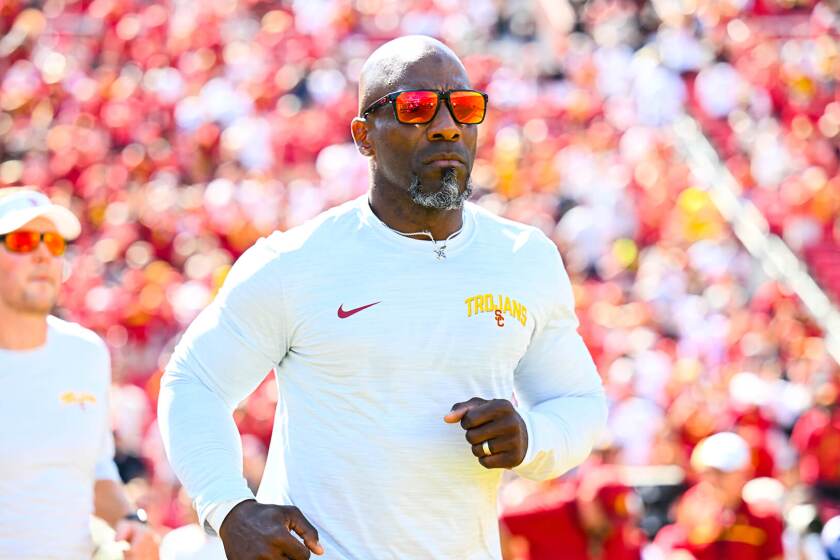A mouthpiece says it all
- Share via
With one tricolored mouthpiece, USC’s Mark Sanchez has done more to advance the image of Mexicans in Southern California than a thousand marches could ever hope to achieve.
Last Saturday, the sophomore backup quarterback led the Trojans to a 38-0 mauling of Notre Dame’s Fighting Irish. Reporters asked Sanchez afterward why he protected his teeth with a plastic mold decorated like the Mexican flag -- green, white and red, with a miniature eagle clutching a snake while perching on a cactus -- right in front of his incisors. The 22-year-old didn’t flinch. “It’s my heritage,” he stated.
Describing the mouth guard as “sweet” and “cool,” Sanchez went on to explain that using it was a “a portrayal of my love for my race” and hoped that his fashion flair “inspires” young Latinos who follow USC to do what he does: quarterback while Mexican. When a reporter told him some Trojans fans already were race-baiting his dental decision on radio and on Internet chat boards, Sanchez remained unfazed. “I didn’t know it was that big of a deal,” he told a reporter. “Was it bad?”
The mouthpiece and subsequent interview might not be as iconic a civil rights moment in sports as the raised fists of Olympians Tommie Smith and John Carlos, or Jackie Robinson’s first Major League swing, but Sanchez’s actions are nevertheless profound. In this era when many Americans fret that Mexican immigrants and their children are destroying this nation, it’s stunning that a prominent athlete such as Sanchez professes pride in his spicy roots -- and also does it so nonchalantly.
America, meet your postmodern Mexican: one not hung up on your eternal suspicion of his ethnicity, one for whom multiculturalism is an afterthought, as natural and acceptable as breathing air.
Sanchez is by no means the first Latino quarterback to celebrate his ancestry. In the summer of 1970, Sports Illustrated featured Joe Kapp on its cover with the headline “The Toughest Chicano” after he led the Minnesota Vikings to the Super Bowl. In the present, journeyman Jeff Garcia and the Dallas Cowboys’ Tony Romo speak fondly of their Latino upbringings. And do you wonder why so many Latinos love the Oakland Raiders? It’s gracias to coach Tom Flores and half-Irish, half-Mexican QB Jim Plunkett, who helped the Raiders win two Super Bowls in the 1980s.
But those men were shackled by the proprieties of professional sports. They were Latinos, but only to a point. “Whether the Raiders win or lose the Super Bowl game, millions of Latinos will be proud simply that Flores and Plunkett are there,” wrote the late, great Los Angeles Times columnist Frank del Olmo in 1981, in the run-up to Super Bowl XV. “For they will be there not as representatives of their people but as competent professionals whose skill, determination and hard work have brought them to the pinnacle of success in their field.” Sanchez, on the other hand, comes from a different generation of Mexicans, one who, more at ease with our country’s churning demographics, feels no obligation to downplay their mexicanidad.
Sanchez -- who is technically a third-generation Mexican American from ritzy Mission Viejo in Orange County -- notably didn’t identify himself as a Mexican American, Chicano or even American. Nope, just as Mexican. The first two qualify his identity, while Sanchez (like so many of his peers, myself included) doesn’t feel it necessary to proclaim he’s an American. That’s kind of a given when you speak fluent English and were born and raised in this country. Giving such a shout-out to your pedigree is akin to Boston Red Sox fans donning Irish green ball caps, or New Jersey wiseguys crooning “Volare” along with Dino -- an expression of ethnic solidarity, not sedition.
--
Crucially, Sanchez stressed to reporters that his mouthpiece wasn’t “a Mexican Power thing,” undoubtedly referring to Chicano yaktivists who scream about stolen territories to the unending embarrassment of so many of the Mexicans they profess to represent.
Surprisingly, ethnicity had never been a part of the Sanchez story. Profiles of him always mention that he was Parade magazine’s high school player of the year in 2005, the CIF title his Mission Viejo High team won in 2004, his dark wavy hair. Few reporters asked about his surname, probably assuming Sanchez was a Latino like Jessica Alba: distanced from the border to the point of disavowing, or even ridiculing, such heritage. It took an inside joke between Sanchez and the Trojans’ team dentist (a Cuban American who created the Mexican mouth guard in a game of quien-es-mas-macho) for the media to wake up and smell the tacos.
Plenty of USC’s conservative followers wish Sanchez had kept identity politics off the gridiron. (If the same scenario had played out at my alma mater, UCLA, we already would have renamed Spaulding Field after Sanchez.)
And that’s what makes his mouthpiece even more significant. It’s easy to dismiss community activists as loudmouths, but nearly impossible to ignore someone who effortlessly slings 60-yard passes and has yet to reach his full potential. For better or worse, athletes can do more for civil rights than community leaders. And even if Sanchez never speaks about Mexicans again, he accomplished this much: He’s shown Americans that Mexicans can be as Rockwellian as a Nebraska farm boy.
Don’t like it, ‘SC fans? Fine. Us Bruins will gladly take Sanchez -- between him and hoopster Lorenzo Mata-Real, we can stage a sports reconquista. Fight on, indeed.
More to Read
Go beyond the scoreboard
Get the latest on L.A.'s teams in the daily Sports Report newsletter.
You may occasionally receive promotional content from the Los Angeles Times.







